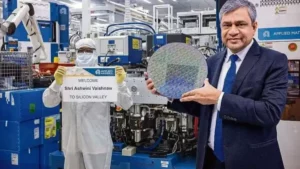Introduction
In the fast-paced world of semiconductor manufacturing, engineers play a vital role in designing and optimizing processes. However, behind the scenes, there exists a diverse array of roles critical for the smooth functioning of assembly lines and production floors. These roles, often requiring specific technical skills and qualifications, provide exciting career opportunities for individuals with varying educational backgrounds.
If you’re considering a career in semiconductor manufacturing but don’t have an engineering background, don’t be discouraged. There are plenty of opportunities for individuals with diplomas, vocational training, or even high school education, provided they possess the requisite skills and willingness to learn. As technology continues to advance, the demand for skilled professionals in semiconductor manufacturing will only grow, making it an attractive industry for aspiring individuals from diverse educational backgrounds.
Follow us on Linkedin for everything around Semiconductors & AI
9 Job Profiles For Diploma Holders in a Semiconductor Fab
1. Technician/Operator:
Job Role: Technicians or operators are responsible for operating and monitoring the equipment on the production floor. They ensure that machines are running smoothly, perform routine maintenance checks, and troubleshoot any issues that arise during the manufacturing process. Technicians also adhere to safety protocols and quality standards to maintain efficient production.
Skills: Basic knowledge of semiconductor manufacturing processes, ability to operate and monitor equipment, troubleshooting skills, attention to detail, adherence to safety protocols.
Educational Qualification: Diploma or certification in Electrical, Electronics, or Mechanical Engineering; Vocational training (ITI) in relevant fields.
Read More:Read More: $6.4 Billion Chips Act Grant for Samsung: $40 Billion Investment to Create 21,500 Jobs – techovedas
2. Quality Control Inspector:
Job Role: Quality control inspectors are tasked with ensuring the integrity of semiconductor components by conducting thorough inspections. They visually examine products for defects, measure dimensions, and perform functional tests to verify performance. Inspectors document their findings and work closely with production teams to address any quality issues.
Skills: Ability to perform visual inspections of semiconductor components, understanding of quality standards and procedures, attention to detail, documentation skills.
Educational Qualification: Diploma in Quality Control, Electronics, or related fields; Certification in Quality Assurance may be advantageous.
Read More: $44 Billion : Why Is Samsung Increasing Semiconductor Investment in US?
3. Equipment Maintenance Technician:
Job Role: Equipment maintenance technicians are responsible for the upkeep and repair of semiconductor manufacturing equipment. They perform routine maintenance tasks, diagnose equipment malfunctions, and carry out repairs to minimize downtime. Technicians also conduct preventive maintenance to prolong the lifespan of machinery and ensure optimal performance.
Skills: Troubleshooting and repair of semiconductor manufacturing equipment, knowledge of mechanical and electrical systems, understanding of preventive maintenance procedures, ability to follow technical manuals and diagrams.
Educational Qualification: Diploma in Electrical, Electronics, or Mechanical Engineering; Vocational training (ITI) with specialization in equipment maintenance.
Read More: $6.4 Billion Chips Act Grant for Samsung: $40 Billion Investment to Create 21,500 Jobs – techovedas
4. Material Handler/Warehouse Operator:
Job Role: Material handlers or warehouse operators oversee the handling and storage of semiconductor materials and components. They receive incoming shipments, verify contents, and stock materials in designated areas. Operators also fulfill orders, prepare shipments for delivery, and maintain accurate inventory records to support production operations.
Skills: Inventory management, familiarity with handling semiconductor materials and chemicals, ability to operate material handling equipment (such as forklifts), adherence to safety and quality standards.
Educational Qualification: High school diploma or equivalent; Vocational training in logistics or warehouse management preferred.
Read More: Samsung Steals $752 Million AI Chip Deal with Mach-1 from Nvidia
5. Cleanroom Technician:
Job Role: Cleanroom technicians play a crucial role in maintaining cleanliness and contamination control within semiconductor fabrication facilities. They adhere to strict cleanroom protocols, donning protective attire and following proper procedures to minimize particle contamination. Technicians clean equipment, monitor environmental conditions, and contribute to maintaining a sterile manufacturing environment.
Skills: Knowledge of cleanroom protocols and procedures, understanding of contamination control measures, ability to perform tasks in a cleanroom environment while wearing appropriate attire (bunny suits), attention to detail.
Educational Qualification: Diploma in Cleanroom Technology, Electronics, or related fields; Training in cleanroom protocols and procedures.
Read More: $44 Billion : Why Is Samsung Increasing Semiconductor Investment in US?
6. Process Technician:
Job Role: Process technicians are responsible for executing semiconductor manufacturing processes according to established protocols. They follow process recipes, monitor process parameters, and collect data to ensure product quality and consistency. Technicians troubleshoot process deviations, implement corrective actions, and support engineering teams in process optimization efforts.
Skills: Familiarity with semiconductor fabrication processes, ability to follow process recipes and protocols, data collection and analysis skills, troubleshooting abilities, adherence to quality and safety standards.
Educational Qualification: Diploma in Electronics, Electrical, or Mechanical Engineering; Specialized training in semiconductor manufacturing processes.
Read More: Nvidia vs AMD: 5 Factors to Consider When Choosing Most Cost Efficient GPU – techovedas
7. Production Planner Technicians:
Job Role: Production planners or schedulers technician oversee the coordination of production activities to meet demand and optimize resource utilization. They create production schedules, allocate resources, and prioritize tasks to ensure timely completion of orders. Planners collaborate with cross-functional teams, monitor production progress, and adjust schedules as needed to accommodate changes in demand or capacity.
Skills: Understanding of production planning principles, ability to create production schedules, coordination with different departments to ensure timely delivery of materials and components, proficiency in using scheduling software.
Educational Qualification: Diploma in industrial engineering, Operations Management, or related fields; Certification in Production Planning may be advantageous.
Read More: Samsung Steals $752 Million AI Chip Deal with Mach-1 from Nvidia
8. Logistics Technicians:
Job Role: Logistics Technicians manage the flow of materials and goods throughout the semiconductor manufacturing supply chain. They coordinate inbound and outbound shipments, arrange transportation, and ensure compliance with customs regulations. Coordinators track shipments, resolve logistics issues, and optimize logistics processes to minimize costs and improve efficiency.
Skills: Coordination of inbound and outbound shipments, knowledge of customs regulations and documentation, proficiency in using logistics software, communication skills for coordinating with suppliers and carriers.
Educational Qualification: Diploma in supply chain , Logistics, or related fields; Certification in Logistics or Transportation Management may be preferred.
Read More: Nvidia vs AMD: 5 Factors to Consider When Choosing Most Cost Efficient GPU – techovedas
9. Facilities Technician:
Job Role: Facilities technicians are responsible for maintaining the infrastructure and systems within semiconductor manufacturing facilities. They perform preventive maintenance on HVAC systems, plumbing, electrical systems, and other facility equipment. Technicians respond to facility emergencies, troubleshoot equipment failures, and ensure compliance with safety and environmental regulations.
Skills: Maintenance and repair of facility systems (HVAC, plumbing, electrical), knowledge of safety regulations, ability to perform preventive maintenance tasks, troubleshooting skills.
Educational Qualification: Diploma in Facilities Management, Electrical, or Mechanical Engineering; Vocational training (ITI) in facility maintenance.
Each role within a semiconductor fab demands specific skill sets and educational qualifications. While engineers often spearhead the design and optimization of manufacturing processes, technicians, operators, and support staff ensure the seamless execution of these processes on the assembly line. From maintaining equipment to monitoring quality standards, every role contributes to the overall efficiency and success of semiconductor production.
Read More: Microsoft to Invest $2.9 Billion in Japan Data Centers Amid AI Boom – techovedas
Conclusion:
In conclusion, whether you’re a recent graduate with a diploma or someone looking to transition into a new field, the semiconductor manufacturing industry offers a multitude of career paths beyond engineering. By acquiring the necessary skills and qualifications, you can embark on a rewarding journey in assembly line and production roles within semiconductor fabs, contributing to the innovation and advancement of technology in this dynamic industry.




